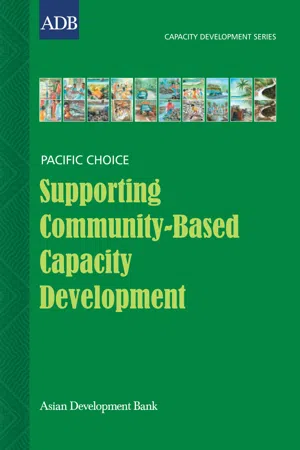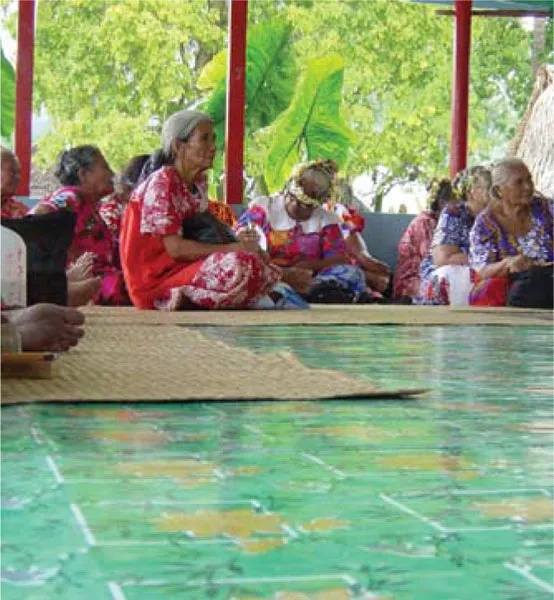
- 34 pages
- English
- ePUB (mobile friendly)
- Available on iOS & Android
eBook - ePub
Supporting Community-Based Capacity Development
About this book
Tuvalu, the fourth smallest country in the world, with an estimated population of 10,440, is an isolated and resource-poor country that relies mainly on royalties received for access to its exclusive economic zone and remittances as its main sources of foreign exchange. This case study describes how the Falekaupule Trust Fund (FTF) was established in the 1990s, with support from the Asian Development Bank, as a mechanism to help build capacity for outer island development, relying on participatory methods to "put power in the hands of community members."
Tools to learn more effectively

Saving Books

Keyword Search

Annotating Text

Listen to it instead
Information
MAJOR LESSONS LEARNED
Stephen Boland, ADB’s rural development capacity building expert[16] for the program, had the following to say about the 3-year implementation:
Widespread education campaigns at the grass roots level were crucial to providing understanding of the FTF and its purpose and use. Additionally, baseline data collected in 2001 and 2003 through PME surveys helped to measure the overall impact of the Program.
Unfortunately, timely translation of the Act and the Deed, essential when dealing with island communities, did not occur. This partly explained the problems over the FTF Deed, which was produced in English without translation. In future, budget allocations in loans or piggybacked technical assistance should be provided to cater for this need, as well as allowance for the delays associated with translation.
There is a view within the Government that the success of the Tuvalu Trust Fund has been influenced by the ongoing technical assistance available to the TTF to support its corporate governance. This includes the funding of the TTFAC and the Board members who include representatives from the governments of Australia, New Zealand, and the United Kingdom. The logical extension of this view is that the long-term success of the FTF needs ongoing TA [technical assistance] and advice provided by external parties. Given that capacity constraints are significant in microstates, this has implications for ADB’s Pacific strategy that encourages the use of trust funds as an avenue for assistance. Long-term advice is needed to strengthen their governance and ensure access to expert advice, thereby maximizing the chances of success.
As has been identified many times in the past, the need for counterpart staff is critical for the success of projects. The Program has been handicapped by lack of staff in the executing agency, the ministry of home affairs and rural development (MHARD), since many staff have been absent on long-term training. Not only does this mean a counterpart was difficult to identify, but there were often competing demands on the time of the counterpart meaning that the full transfer of skills was not always possible. This has been complicated by the ability of the Ministry to retain staff because of its perceived lack of prestige. In the future, these issues should be considered before proceeding with the project, or stronger constraints should be placed on the executing agencies to ensure adequate counterpart staff is available. It is recognized, however, that there will always be factors beyond the control of the project designers.
The assignment of counterpart staff should consider the capacity constraints of the executing agency to ensure that counterparts can dedicate their full time to maximising the transfer of skills.
There should be fewer tranche conditions. The conditions imposed should relate directly to the loan, and be objectively verifiable and measurable. The objectives should also be strictly enforced to ensure that real changes take place that will achieve the stated objectives of the project. Allowance could be made where changes take place that are beyond the control of the Government.
Based on the experiences of designing and implementing the Falekaupule Trust Fund (FTF), the following additional lessons are considered relevant for similar programs, especially trust funds serving remote, resource-poor communities[17]:

1) To build capacity in remote communities, it is important to provide sufficient resources to take training, and other forms of capacity building, to the communities. This can be resource intensive and should be recognized with appropriate budgets.
2) Complementing this is the need to translate important documents into local languages, and to provide easy-to-understand summaries of key points, to ensure understanding and ownership of the process, outputs, and outcomes.
3) It is also important that all community groups, including women and youth, as well as the traditional leadership, be engaged in the learning process. Such engagement must be undertaken sensitively but effectively in targeted focus-group sessions where the participants can feel fully engaged. Board members of the trust fund need to be given training not only in their fiduciary duties but also in how best to communicate board decisions and information to communities.

4) Terms of reference for technical assistance should be focused to ensure that resources are not spread too thinly across many tasks. In the case of FTF, assistance could have been more focused on the implementation of the fund and establishment of appropriate governance structures. Capacity development of the Kaupule staff would either need increased resources from ADB or, more appropriately, cooperation with other multilateral or bilateral donors.
5) Capacity building should be started at an early stage and should not be left until the fund is operational. Once the funds are flowing to the local authorities, it becomes very difficult to change practices. New systems and governance and accountability structures must be in place from the start. Guidelines and common briefing/information papers must be clear so that all concerned get the same messages (thus avoiding some of the misinformation that appears to have occurred in relation to the FTF).
6) As many of the concepts and practices are quite foreign to the stakeholders, training must be seen as an ongoing task. It needs to be pitched at an appropriate level for local stake...
Table of contents
- Front Cover
- Title Page
- Copyright Page
- Contents
- Foreword
- Introduction
- The Falekaupule Trust Fund: Origins of the Initiative
- Formalizing the Agreement
- Strengthening Local Governance—the other Cornerstone
- Assessing Results
- Dispute over the Distribution Formula
- Fund Performance
- Major Lessons Learned
- Back Cover
Frequently asked questions
Yes, you can cancel anytime from the Subscription tab in your account settings on the Perlego website. Your subscription will stay active until the end of your current billing period. Learn how to cancel your subscription
No, books cannot be downloaded as external files, such as PDFs, for use outside of Perlego. However, you can download books within the Perlego app for offline reading on mobile or tablet. Learn how to download books offline
Perlego offers two plans: Essential and Complete
- Essential is ideal for learners and professionals who enjoy exploring a wide range of subjects. Access the Essential Library with 800,000+ trusted titles and best-sellers across business, personal growth, and the humanities. Includes unlimited reading time and Standard Read Aloud voice.
- Complete: Perfect for advanced learners and researchers needing full, unrestricted access. Unlock 1.4M+ books across hundreds of subjects, including academic and specialized titles. The Complete Plan also includes advanced features like Premium Read Aloud and Research Assistant.
We are an online textbook subscription service, where you can get access to an entire online library for less than the price of a single book per month. With over 1 million books across 990+ topics, we’ve got you covered! Learn about our mission
Look out for the read-aloud symbol on your next book to see if you can listen to it. The read-aloud tool reads text aloud for you, highlighting the text as it is being read. You can pause it, speed it up and slow it down. Learn more about Read Aloud
Yes! You can use the Perlego app on both iOS and Android devices to read anytime, anywhere — even offline. Perfect for commutes or when you’re on the go.
Please note we cannot support devices running on iOS 13 and Android 7 or earlier. Learn more about using the app
Please note we cannot support devices running on iOS 13 and Android 7 or earlier. Learn more about using the app
Yes, you can access Supporting Community-Based Capacity Development by Brian Bell in PDF and/or ePUB format, as well as other popular books in Economics & Sustainable Development. We have over one million books available in our catalogue for you to explore.